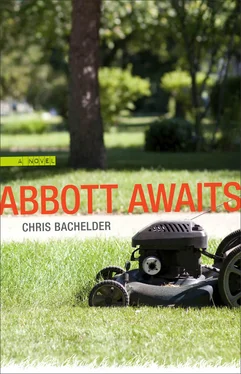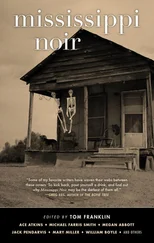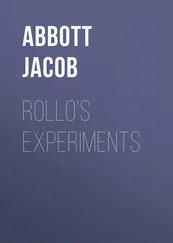Fucking Thoreau — he could, for his part, happily do without the post-office . Leave it to the childless to be complacent about the mail. You put a toddler in Walden and you’d get new philosophy. For his part, Abbott takes great comfort in the reliable work of the postal service, a representative of which comes to his neighborhood in the mid- to late afternoon six days a week, every week. The mail is an undeniably significant part of his day. It not only signals the blessed arrival of the mid- to late afternoon, it also offers the promise of surprise and wonder. Today there is nothing surprising or wonderful, and in fact there never is. But there is the promise. Today it’s a bill and three more baby catalogues. Abbott and his wife used to feel irked and mildly infringed upon by the fact that these companies somehow knew they were going to have a baby. But then they started flipping through the catalogues, and they found a lot of interesting stuff. Abbott sees four neighbors from four houses on his side of the street, all walking to or from their mailboxes. The mail truck is still moving down the street, and it continues to draw more neighbors from their houses. The scene feels a bit like a nature documentary. Everyone greets one another in a mechanical fashion, waving first to their eastern neighbors and then to their western neighbors. It’s like they’re all riding in a parade. Abbott does not even focus his eyes on a person or people — he just transmits vague signals of salutation to his counterparts. This is, to the best of Abbott’s knowledge, a weekday. Don’t his neighbors have jobs? And what could they all be expecting every day that is so important? Why this desperate rush? The awkward trip to the mailbox is enough to make Abbott want to wait a few minutes each day after delivery before checking his mail. On the other hand, he knows there are limits to what a man can ask of himself.
17 Abbott Adds a Key to the Ring
Abbott does not consider the broken doorknob on the seldom-used front door a high-priority repair, or even a problem. “So we can’t get out,” he says to his wife. “People can’t get in. It’s kind of a nice feature.” “But what if there was a fire?” his wife says. She is a very skilled wife. This afternoon, during the child’s nap, Abbott drives to the hardware store to purchase a doorknob. He stands in the doorknob aisle for fifteen minutes. Faced with a choice between many seemingly identical doorknobs, Abbott purchases the second most expensive one and takes it home in a bag. The installation is supposed to be easy, but it is not. The doorknob and the screwdriver become slippery in the moist air. The dropped screws clatter and vanish. Eventually, Abbott replaces the doorknob, then makes small noises and gestures of completion until his wife says, “Looks good. Nice job.” Since Abbott did not replace the deadbolt, which was not broken, he now has two different keys for a door he does not use. He puts the new key on his ring, which has become heavy and crowded. What is that blue one for? It was only seven years ago — no, six — that Abbott left Texas in a small moving truck, after completing his lease and donating his Plymouth Reliant to an organization that teaches troubled teens to fix transmissions. At that point he had no keys. Not one. A putative adult with an empty key ring. He had forsaken the air-conditioning on his drive out of Texas. He had opened the windows and let the hot wind blow freely through the cab. The last time he told this story to his wife, she laughed and said, “Why don’t you just tell me about a woman you enjoyed having sex with?” Stepping onto his porch with his screwdriver and jangling keys, he recalls the story of the empty key ring with a powerful sense of boredom. He closes the front door and tests the new doorknob and the lock. He turns and pushes, turns and pulls. He listens for the click, and he hears it.
Tonight Abbott is a generality, a tendency, a convention. He is an indistinct and featureless lump beneath a thin blanket. Tonight he is Husband on Couch. The battered cushions sag beneath the weight of his unoriginality. He is complicit, he knows. Nobody can make you be Husband on Couch. Wife in Big Bed can’t. You always have choices. Abbott could hop a freight train, ride the rails, build fires in trash cans. Or he could be Husband on Air Mattress, just for the principle. The fight was painfully stupid. Abbott, lying in bed, asked his wife if her novel is any good. She said, “Oh, you know.” Then he asked what her novel is about. He didn’t even care; he was just making bedtime conversation. She said, “Oh, you know.” He studied the title, the cover. He tried to peek at the author photograph. He said, “I do know. It’s about marriage and secrets and faith. Am I right? And the strange settling sounds an old house makes at night? And that angle of light in the winter?” Abbott’s wife did not say anything. Abbott said, “Loss of youth. Estrangement. A nice meal ruined by the truth. A long walk during which it becomes shockingly evident that the natural world is violent and ruthless.” Abbott’s wife said, “Are you done?” Abbott said, “ Passion . Memory. Forgiveness. Seething things beneath a placid surface. A tree cleft by lightning.” Abbott’s wife closed her book and said, “Is there something you’d like to talk about?” Abbott realized that he was spoiling any chance of a good night’s sleep for his wife, but he knew if he stopped now it would appear that he knew he was acting poorly, and that was not an admission he was prepared to make. He was operating by a strongly felt but dimly understood sense of correctness. “The smell of the cut grass, the feel of the cut grass on bare feet, the memories of walking on cut grass with bare feet in simpler times.” Abbott’s wife said, “Stop yelling.” Abbott said, “I’m not.” Abbott’s wife said, “If there’s something you’d like to say to me, then say it.” Abbott said, “She lives in upstate New York with her husband, her two children, and her two horses.” Abbott’s wife said she didn’t care about the novel but he was being an ass. And of course she rolled over to face away from him. It had taken Abbott, without premeditation, something like two minutes to wreck the night. Then, apropos of nothing beyond his own insensitivity, he said, “I know about the water in the basement.” He found a tone to make it cruel. He got out of bed and stood up. Abbott’s wife held her book with her index finger marking her place. She did not move and did not speak. Beside her, on her nightstand, that small porcelain dish filled with earplugs. He left the room and arrived unimaginatively on the horrible family-room couch, a stained and cat-tattered mound of soft dough. The dog came with him, but then returned to the bedroom after a few minutes. Abbott does not anticipate falling asleep anytime soon, but the next thing he knows his wife is shaking his leg. He opens his eyes to see her holding her novel and a steaming mug. The lamplight makes him squint. He rubs his eyes, pats the listless cushions for her to lie down with him. “This is my spot,” she says. Abbott extracts himself from the couch and limps down the hallway, dragging his thin blanket like a vagabond. That’s way too fast, he thinks, hearing a car drive past his house.
19 Abbott and the Sticky Shit All Over the Fucking Steering Wheel Again
Gone are the daydreams of academic notoriety and glistening vulvas and whatever else. All Abbott wants right now — the only thing — is to be knocked unconscious by the long wooden handle of a lawn tool.
Читать дальше












